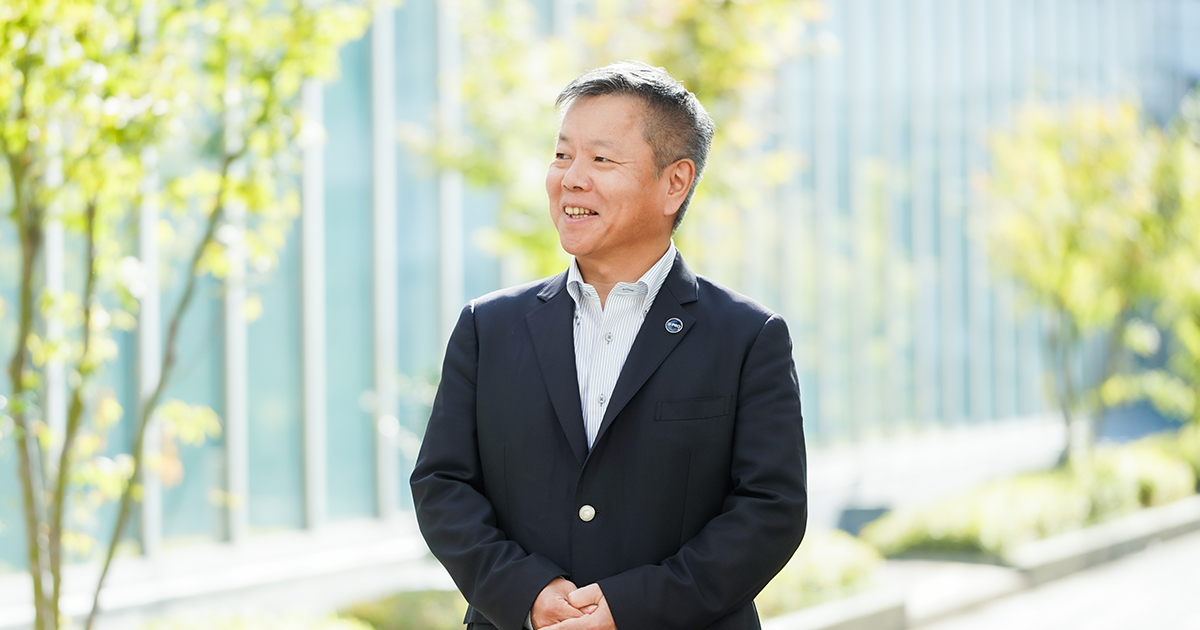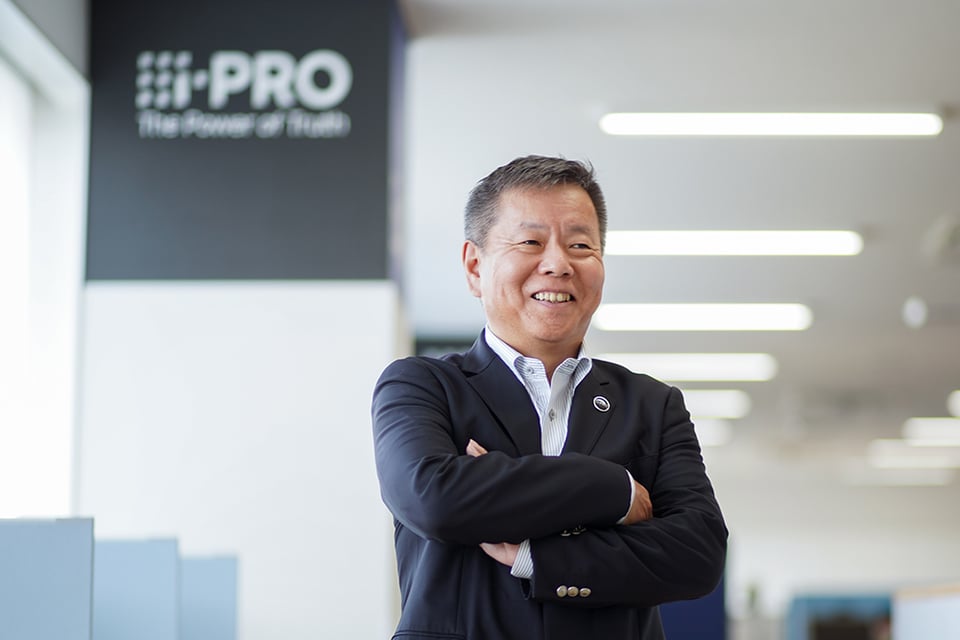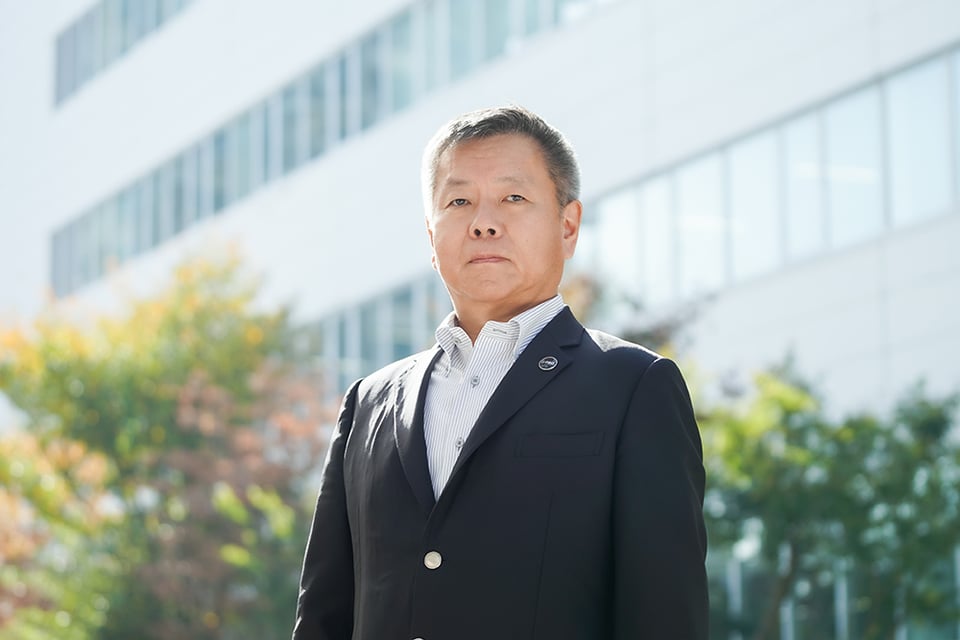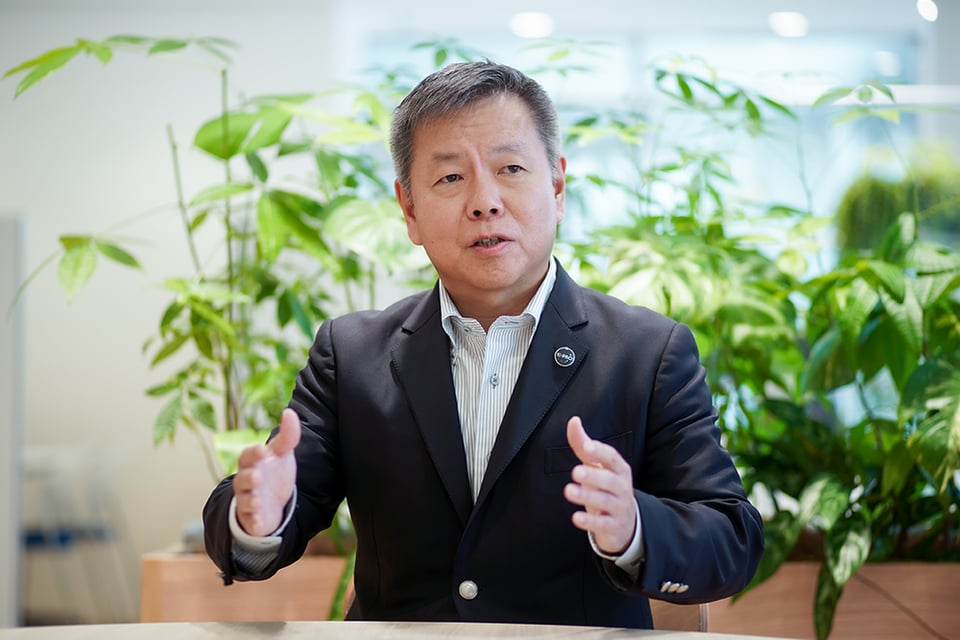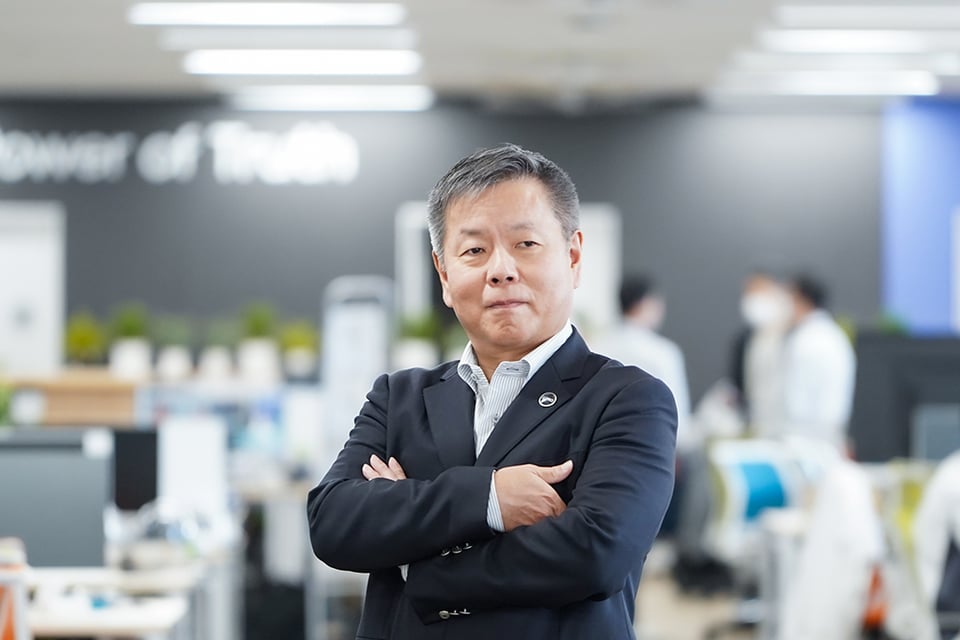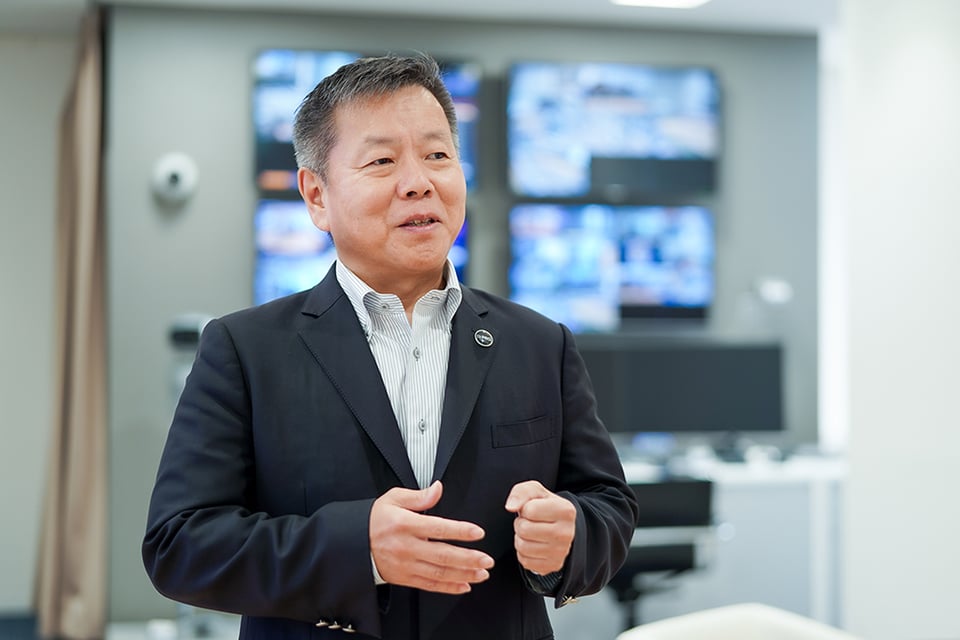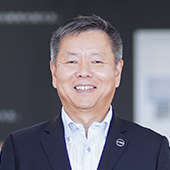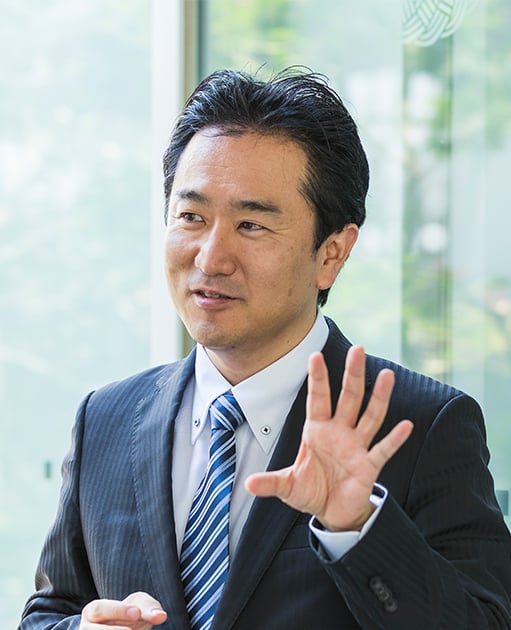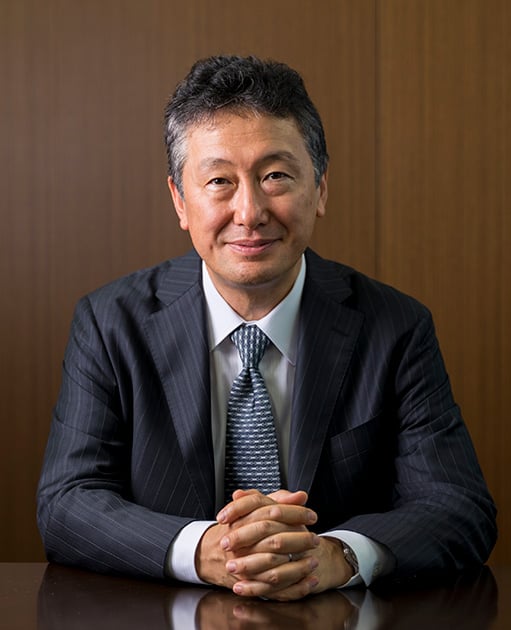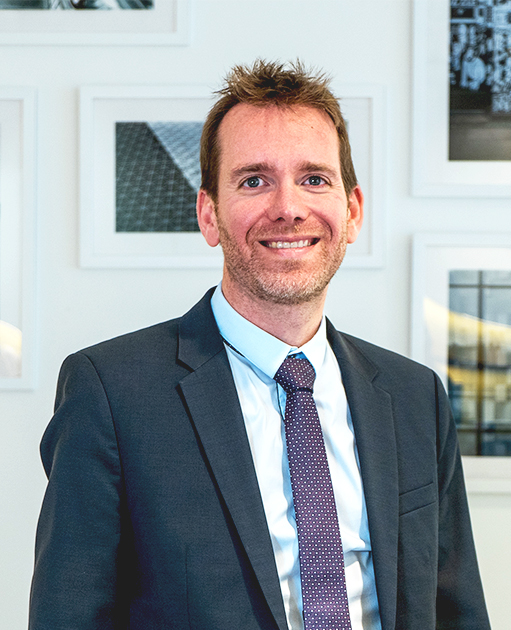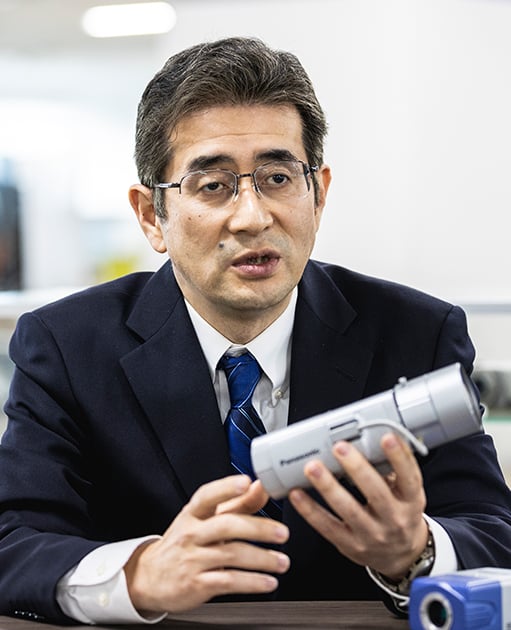Masami Eguchi heads i-PRO’s security and safety business outside Japan and the United States. Currently based at the company’s US office in Houston, Texas, he is responsible for developing its global strategy. Drawing on a wealth of overseas experience in Germany, Singapore and the United States, he shares his frank opinions on the current landscape and what he sees as the keys to i-PRO’s success in the global market.
Three continents, seventeen years: the start of a global career
Q. You currently live in Houston, i-PRO’s base in the United States. What’s the city like?
Houston is growing rapidly – it’s now the third or fourth largest city in the United States. It was built on oil and gas, so while there have been ups and downs depending on the global political situation, it’s essentially a city with a lot of wealth. What’s more, there’s no income tax [in the state of Texas].
Q. How do you spend your weekends?
My doctor told me to walk and play golf at least once or twice a week for my health, so now that’s what I do. Golf is very cheap in Houston – on weekends, you can play for just $20. The golf course is only 15 minutes’ drive from my house. My wife complains that I go every week, but it’s doctor’s orders, so I have no choice [laughs].
I reserve for one, but I usually end up playing with others. Sometimes three of us play together, sometimes four. We all exchange “nice to meet you”s, because most of the time we've never met before. There are only a few white people on the golf course: there are African-Americans, Latinos, Taiwanese, Koreans, Vietnamese… All different kinds of people, and I enjoy having conversations with them. My weekend games of golf are one of the most interesting parts of my life here.
Q. Did you always want to be posted overseas?
I never wanted to go abroad in my life [laughs]. And I didn’t want a job that involved a lot of relocating. When I was a child, I had to change schools every three years because of my father's job. Every time I had to make new friends, so I didn’t establish connections with people. I never had a sense of where my hometown was or who my longtime friends were.
That’s why I chose to work for Kyushu Matsushita Electric – because I thought I wouldn’t be transferred very often, and if I were it would be within Kyushu.
Q. What were you doing at Kyushu Matsushita Electric?
My research at university and graduate school involved software, and I’d also worked with large computers, so I thought that software was the route for me. On joining the company, I was assigned to the department that made software for PBX (key telephone system). I was a software engineer, and I worked hard at it.
That was right at the time when the company wanted to strengthen its telephone switchboard business overseas, so one year after I was hired, I was put in charge of overseas sales support. Over time, the SE part of my job expanded to include sales and marketing. When I was running the German side of things, one of our employees who was temporarily assigned to Germany returned to Japan, so I was transferred there instead and took my wife and child with me. Then just when I thought I was back in Japan for a while, the next thing I knew I was sent to the US, again taking my family with me. When I came back to Japan, I was assigned to a different business unit. That was when I moved from the telephone unit to the security business, where I still work to this day.
After that, I was asked to go to Singapore because the company wanted to strengthen its business in Southeast Asia. So once again, I took my family with me on assignment. When I was first posted abroad, I would return to Japan for a year or two before going back overseas, but after Singapore I went straight to the US without returning to Japan.
By now I’ve been working overseas for 17 years. Between my time in Singapore and the US, I’ve clocked up eight years in a row outside Japan. When I think about it, my children have had to change schools repeatedly, not only within Japan but also across borders. My plan to have a job where I didn’t have to relocate did not pan out at all. But it’s been a good experience, and I think it turned out well.
Bringing a global perspective to product development
Q. What are the differences between the various markets you’ve worked in?
First of all, some markets are more dynamic than others. Take Europe, where we established a new company in Amsterdam in the Netherlands in October: it’s a huge market made up of developed countries with a total population of more than 400 million people. Although it’s a developed market, the south and east of the region still feel very much like emerging markets, and if you look at the continent country by country, naturally each one is different. The languages are different, of course, as are the market sizes. Europe is a market that requires a lot of care. It would be a different story if we were talking about pan-European projects, but since each national market is small, the projects that come up are small too.
In contrast, the US has a population of 300 million people who basically all speak the same language. So the projects we’re looking at there are significantly bigger than those in the EU.
I am now the head of our Security & Safety Global Business, and my main focus is to increase sales in areas outside of Japan and the US, like Europe and Asia-Pacific. At the same time, I’m also endeavoring to create new product content that maximizes sales opportunities globally, including in Japan and the US. That’s because we believe, given how dynamic the market is, that making products that work in the US will ultimately stand us in good stead to respond to changes worldwide.
Q. Is it fair to say that Europe has very strict compliance requirements when it comes to things like privacy and the environment?
Europe is ahead of the rest of the world in terms of environmental regulations such as the RoHS Directive, which restricts the use of certain hazardous substances in electronic and electrical equipment, and GDPR data security as it pertains to human rights. I believe that similar standards will be applied in Asia-Pacific and the US in the future. Paying close attention to these things in Europe first is very important for doing business on a global scale.
Q. How does the Japanese market look from a global perspective?
The security market in Japan looks different from the rest of the world. The models selling well and the competitors coming up – they’re distinct from the ones overseas. If you develop and deploy products with only Japan in mind, you’ll have a tough time in the global market.
At one point Chinese security equipment companies entered the Greater China region in Southeast Asia and suddenly the market landscape changed. There’s no guarantee that the same thing won’t happen in Japan. If it does, the Japanese market environment will have to adapt to global standards. In any case, I believe it’s important to create products that are compatible with the wider world.
Edge AI, a driver for international growth
Q. What kind of strategy do you think i-PRO needs to succeed in the global arena?
i-PRO's market share and sales channel coverage are about the same. If we expand our sales channels, our market share should also increase. But it will take a certain something for us to achieve that.
Right now, edge AI computing is attracting a lot of attention. Various software companies we’ve been working with have told us that the AI in our i-PRO cameras can detect people with outstanding accuracy. All of i-PRO’s recently released cameras are equipped with edge AI computing. Our cameras have various support applications, plus Video Insight, a type of video management software. I think promoting these features is a no-brainer if we want to grow our sales channels.
Q. Which new sectors do you hope to reach with edge AI computing technology?
Right now we’re in the process of targeting security companies that provide remote monitoring and security services using surveillance cameras. Our AI cameras are really good at detecting people, which keeps false alarms to a minimum. Having a lot of false alarms is actually a very big problem in terms of operations, and it’s detrimental to quality of service and cost competitiveness. I believe that our technology offers significant benefits in this respect.
Then there’s the fact that security companies that provide remote guarding services tend to be labor-intensive businesses: if they adopt our AI technology, the cost would be about one-third of putting a human guard on site, and the accuracy of detection would improve considerably. One operator would be able to monitor 50 or 60 locations instead of 20, thus increasing revenue. At the same time, it could lower the price of the service and make the security company more competitive.
What’s more, if a company can eliminate misdetection and take the right action against security threats, customers’ trust in their services will increase. That’s got to be an excellent use of our technology.
Q. What are the challenges when you’re pursuing security companies’ business?
Large security companies tend to already have well-developed systems in place. The challenge is getting our cameras to connect seamlessly to their core systems.
Also, many of the security companies that provide remote guard services are global players. If we can lock down a contract for one of their sites, we might be able to lock down all of them. But if we don't lock down that one site, it makes it difficult for us to expand globally. That’s something I don't have an answer for yet; it all depends on how things play out going forward. I’d like to try and find a way to tackle this challenge by making a breakthrough in Europe first.
Staying ahead by anticipating what the world needs next
Q. Do you have any advice for younger colleagues who want to work in a global environment?
My advice to the younger generation is to think about tomorrow while you’re tackling your work today. I’d tell them to consider how they’re contributing to the job at hand, and how it could be useful in the future. Don’t just work on your own timeline, either: keep an eye on the pace at which the world is doing business. I think these things are good motivators.
Q. Final question: what does i-PRO need to succeed going forward?
i-PRO is a technology company, so we must keep pursuing technologies that the world has a use for.
We also need to anticipate demand. Keeping an eye on what other companies are doing is important, but even more than that, we need to be alert to global trends and take steps to develop technologies that the world will need in future. In the past that’s been challenging: not because we lacked the technology, but because our focus hasn’t always been in the right place. That’s why I would like to see us pay close attention to technological trends and political developments that affect demand, and always strive to stay ahead of the curve.

